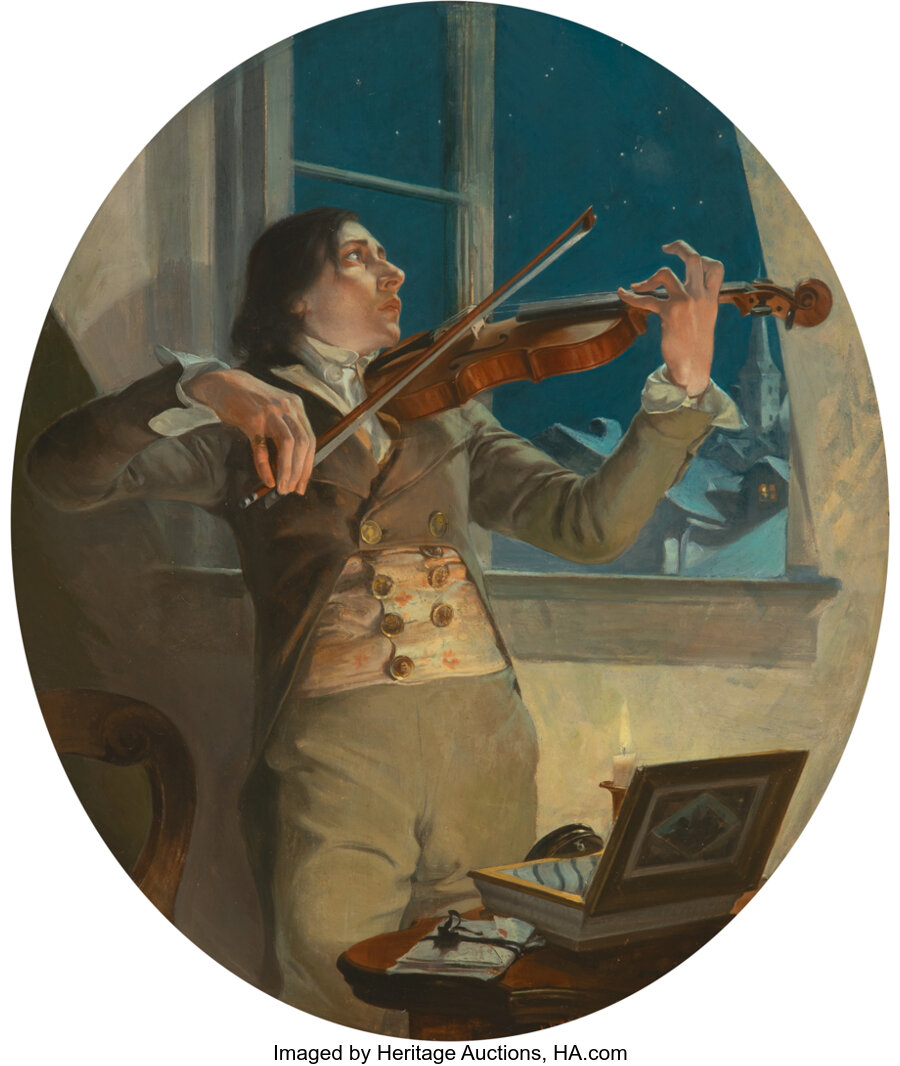Signed lower right: Frank X. Leyendecker
New Rochelle Public Library, New Rochelle, New York, "Frank X. Leyendecker Memorial Exhibition," December 8th- December 12th, 1924.
Private collection, Chicago, Illinois.
Frank Xavier Leyendecker (American, 1877-1924) The Merry Tune and the Sad Heart, The Virtuoso, Collier's magazine cover, January 24, 1905 Oil on board 26-3/4 x 23-1/8 inches (67.9 x 58.7 cm) Signed lower right: Frank X. Leyendecker PROVENANCE: The artist; Augusta Mary Leyendecker, the artist's sister, by bequest from the above, 1924; Orson Lowell, gift from the above, December 1952; Charles Matlack Price, acquired from the above, May 1953; Private collection, Chicago, Illinois. EXHIBITED: New Rochelle Public Library, New Rochelle, New York, "Frank X. Leyendecker Memorial Exhibition," December 8th -- December 12th, 1924; Mount Tom Mansion, New Rochelle, New York, circa 1924. LITERATURE: New Rochelle Public Library, Frank X. Leyendecker Memorial Exhibition, New Rochelle, New York, 1924, n.p., no. 41. Born in Montabaur, Germany, and later emigrating to the bustling streets of Chicago, Frank X. Leyendecker embarked on an artistic odyssey that would etch his name into the annals of American illustration. With his roots tracing back to an entrepreneurial family that immigrated to the United States, settling in a city where his uncle owned the McAvoy Brewery, Frank, alongside his brother Joseph Christian (J.C.), pursued artistic studies at the Art Institute of Chicago. This educational journey extended overseas to Paris, at the Académie Julian during 1896-1897, a pivotal era for the arts in Europe. Frank's initial professional foray was with Carl Brandt's stained-glass business in Chicago. However, upon his return from France in 1897, the Leyendecker brothers ventured into the burgeoning field of illustration, marking the beginning of their illustrious careers. They established a shared studio in Chicago, achieving early acclaim in advertising, setting the stage for a relocation to New York City in 1900. It was here that Frank's career soared, most notably with his contributions to Collier's magazine, where he produced sixty covers, a testament to his prolific talent and the public's adoration of his work. Despite his early successes, Frank's career was perennially overshadowed by that of his brother, J.C., leading to the moniker "The Lesser Leyendecker." Compounded by personal struggles, including a battle with addiction, Frank's life and career took a turbulent turn. His return from France marked the beginning of these struggles, which persisted throughout his life, casting a pall over his professional achievements. Nonetheless, Frank's work, especially his Collier's covers, remains a significant contribution to the field of magazine illustration, celebrated for its artistic merit and historical importance. Frank's talent also shone through in his diverse portfolio, which included work for prestigious publications and companies, such as The Saturday Evening Post, Vogue, Vanity Fair, and significant advertising campaigns for the likes of Kuppenheimer Clothes and Howard Watch, predating his brother's involvement with the brand. The zenith of Frank's career saw him moving into a private wing of J.C.'s mansion in New Rochelle, New York, a period marked by familial discord and personal decline. His life was further complicated by tensions with Charles Beach, J.C.'s partner, leading to a departure from the Leyendecker residence. Frank's later years were characterized by his struggle with depression and addiction, culminating in his untimely death from a morphine overdose in 1924. Despite his tragic end, Frank X. Leyendecker's legacy as a preeminent artist and illustrator endures. His obituary lauded him as one of the country's foremost artists, a sentiment echoed by the success of a memorial exhibition held in his honor, which attracted significant public interest. Among the artworks featured in this exhibition was The Merry Tune and the Sad Heart, The Virtuoso, a painting that remained in Frank's possession throughout his life and stands as a testament to his enduring talent and complex legacy. The Merry Tune and the Sad Heart, The Virtuoso encapsulates the artistic brilliance and tumultuous life of Frank X. Leyendecker. It serves not only as a piece of American art history but also as a window into the personal struggles and triumphs of one of the early twentieth century's most intriguing illustrators. The present work is accompanied by the Collier's magazine cover tearsheet, a Collier's limited edition offset lithograph poster, and a copy of the Memorial Exhibition brochure. HID12401132022 © 2024 Heritage Auctions | All Rights Reserved
Condition report available upon request.
Framed Dimensions 36.5 X 33 Inches


